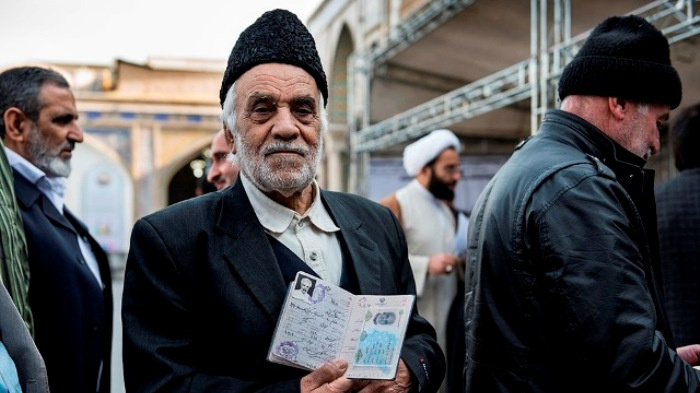Reformists Have Won, We Just Don’t Know about the Principlists Yet

Friday’s two polls in Iran are inherently problematic when seen against a backdrop of the political vista in the country. For the past twelve years, the Guardian Council’s increasingly stricter vetting process has eliminated nearly all prominent reformists from almost all supervisory, executive and legislative seats directly decided through elections. With coming to power of Hassan Rouhani’s Prudence and Hope government, extensively supported by the pro-reform leaders, the latter hope to make a strong comeback in a gesture of reconciliation with the establishment. The other election, of the Assembly of Experts, has traditionally been less significant, usually playing a vanishing twin for presidential or parliamentary elections. This time however, it is said to have high chances of deciding the next Supreme Leader. Now, the moderates and reformists are also challenging the Principlist dominance over the Assembly.
Majlis
When the incumbent Majlis was being elected, most reformists boycotted the election, as they were desperate and frustrated by a series of events after a controversial presidential election in 2009 that ended up with them labeled as seditionists, their prominent figures subject to long terms in prison, self-exile or house arrest. However, the grand narrative took a surprise U-turn when the front succeeded in a course of president-making in 2012 that put Hassan Rouhani in office. It is now popularly referred to, among Iran’s reformists, as a first step for the metaphoric rebirth of the ‘reform phoenix’ from its ashes. Their opponents, the so-called Principlists are already intimidated.
The sweeping disqualifications of the Guardian Council, massively applied to most nominees who bore an emblem of reform and popularly seen as a scheme to empower the Principlists and have the line-up of the tenth Majlis already decided to a large extent, have left the reformists with a total number of nominees that could maximally cover for two third of the vacancies in the parliament. When it became manifest that reconsideration is out of question, a strong coalition with moderates, originally started in 2012, together with initiatives to encourage balloters to vote lists in larger cities prompted optimism to win a strong minority of the seats in the upcoming election.
Assembly of Experts
The significance of the election lies not only in the fact that it might have to choose the next Supreme Leader but also in that, as The Guardian’s Amir Faress points out, the assembly is “allowed to determine its own size and the manner in which it would be elected”. If a strong moderate and/or reformist bloc forms in the assembly, it would be a threat to the Principlist hegemony in the country. This brings to light why an initiative, launched by Akbar Hashemi Rafsanjani to block Guardian Council members Ahmad Jannati and Mohammad Yazdi as well as other conservative clerics such as Ahmad Khatami and Mohammad-Taghi Mesbah Yazdi from the assembly, has become so controversial. An article published on the Persian service of the BBC, arguing that it is mathematically possible to block a trio of Jannati, Yazdi and Mesbah if Rouhani’s supporters in Tehran vote for the Hashemi-backed list, became a pretext for the Principlists to call it a ‘British list’ and demand their opponents to renounce support from the ‘global arrogance’. However, the strategy to accuse the opponents of foreign infiltration soon backfired as Hashemi Rafsanjani and his allies noted that the allegation could question the meticulous vetting by the Guardian Council and expose the country to national humiliation. The Principlists have already recognized the danger. A cleric preacher affiliated with Paydari, a group standing on the far right end of the Principlist spectrum, warned on Wednesday the trio’s elimination is under way, calling it a catastrophe that cannot be stopped. Rumor went viral that hardliners were mobilizing a million voters from small towns and villages to vote in Tehran. This would not be possible as moderate Rouhani’s Intelligence, Communications and Interior ministries are on their toes. Now if the trio fails to enter the assembly, they would be placed in a political impasse with no port of call, as the beneficiaries were themselves monitors of the election from the very beginning and no one can even imagine the Supreme Leader Grand Ayatollah Ali Khamenei to publicly take a side the day after the election. If they matriculate with low ranks from Tehran, their reputation and influence will suffer in the years to come.
Participating is Winning
While many consider a cooperative Majlis of moderates that works hand in hand with the administration the best of all options to tackle a plethora of economic issues in the post-JCPOA era, a more realistically optimal Majlis for the Rouhani administration could be one representing the diversity in the country, without bête noir radicals. Neither reformist nor Principlist radicals can be of any help. The former is prone to introduce a direct faceoff that could eventuate horribly, sending the administration back to square one. The flipside is not any better. A combination of both with moderates and independents is not only more plausible but also closer to a utopian ideal. It gives reformists the voice to demand release of their heavyweights from house arrest and strive toward civil rights, women’s rights, and the right to free expression. The Principlists’ ongoing critique of the administration’s economic measure tips the scales up in an ultimate balance of power.
Whatever comes out the ballot boxes, it seems that the reformists will be the real winners as they chose a path of participation. For years, the Principlists have constantly denied the possibility of any fraud in elections, unconsciously leaving themselves no options but to endorse the results whatsoever. This comes as a blessing in disguise for the reformists, after what they underwent in the past six years.

